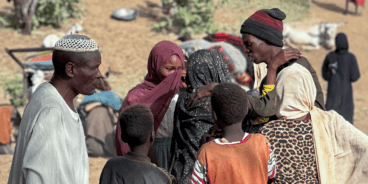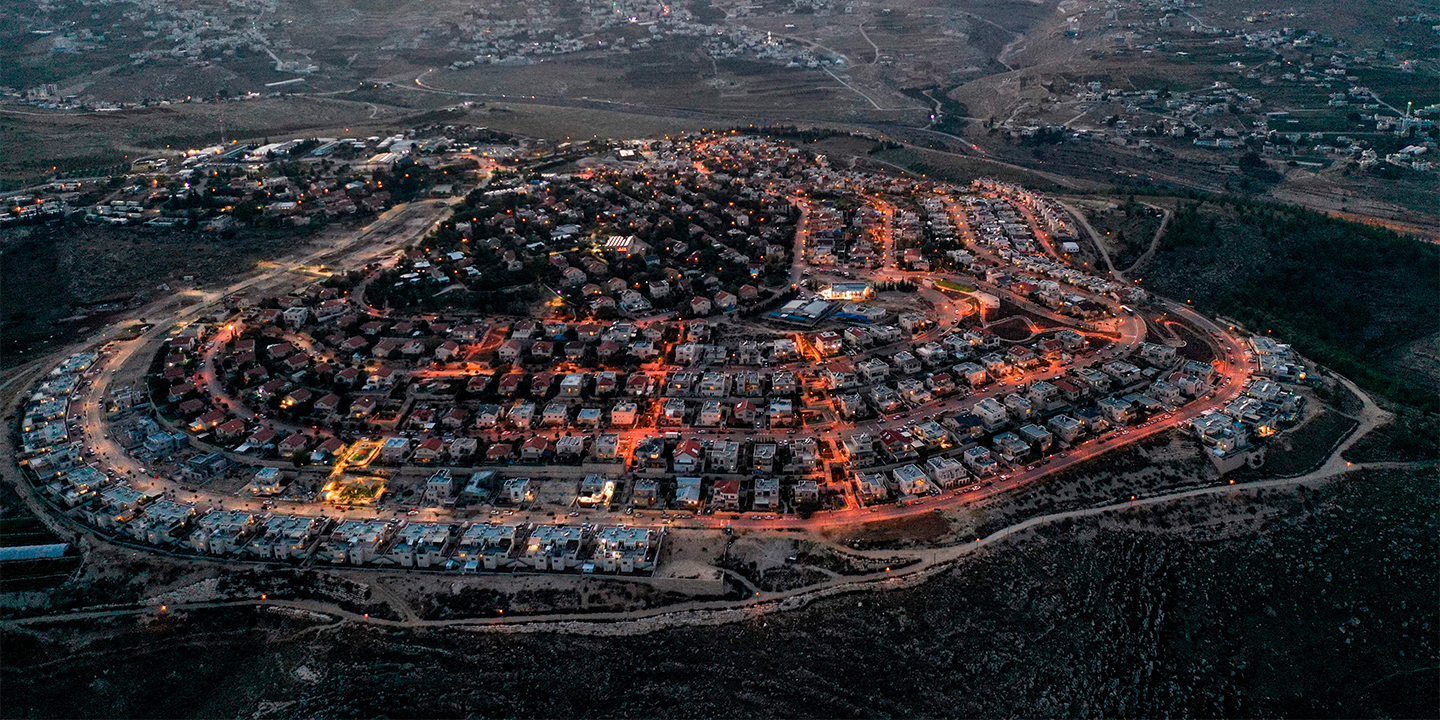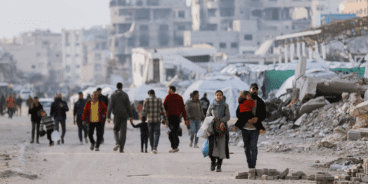

Atrocity Alert No. 372: Israel and the Occupied Palestinian Territory, Myanmar (Burma) and the Central Sahel
Atrocity Alert is a weekly publication by the Global Centre for the Responsibility to Protect highlighting situations where populations are at risk of, or are enduring, mass atrocity crimes.
AS WAR IN GAZA RAGES, PALESTINIANS IN OCCUPIED WEST BANK FACE RISING ATROCITY RISKS
As Israel’s indiscriminate bombardment and ground offensive in Gaza continue to escalate, atrocity risks are mounting in the Occupied West Bank, including East Jerusalem. Across the Occupied West Bank, Israeli forces are employing violent military tactics during search-and-arrest operations and raids, as well as violently suppressing demonstrations. Since 7 October Israeli forces have killed over 150 Palestinians, including 44 children, injured 2,375 others and arrested approximately 2,000 Palestinians. The Office of the UN High Commissioner for Human Rights (OHCHR) has received credible and consistent reports of ill-treatment in detention, concluding that this treatment could amount to torture.
Settler violence has also escalated dramatically since 7 October, with Palestinians facing an average of seven settler attacks per day. In many of these attacks, Israeli settlers have been accompanied by Israeli forces and acted with their acquiescence and collaboration, according to OHCHR. Eight Palestinians, including one child, have been killed and a further 64 injured by Israeli settlers, while at least 111 Palestinian households comprising over 905 people have been displaced since 7 October. Three Israelis have been killed in attacks by armed Palestinians. According to reporting by the New York Times, the Israeli government has requested 24,000 semiautomatic and automatic assault rifles from the United States (US). Israel has indicated that some weapons could be given to civilians, prompting scrutiny by some US State Department officials who fear the weapons might be used to attack or force Palestinians from their homes.
In recent years, Israeli security forces have increasingly deployed lethal force against Palestinians, regardless of the level of threat, including through frequent violent raids on refugee and displacement camps. Prior to this latest war, OHCHR had already reported a record high number of Palestinian deaths in 2022, a number that was exceeded in the first nine months of 2023, making this the deadliest year in the Occupied West Bank since the UN began monitoring casualties in 2005. Amid record-high levels of settler violence and settler-driven displacement, illegal settlements have rapidly expanded. According to the UN Office for the Coordination of Humanitarian Affairs, 849 Palestinian-owned structures have been demolished or seized so far in 2023, displacing over 1,400 Palestinians.
UN Secretary-General António Guterres said, “The occupied West Bank, including East Jerusalem, is at a boiling point.” Israel as the Occupying Power must urgently abide by its obligations under International Humanitarian Law (IHL) to ensure the safety and protection of the occupied Palestinian population. The international community must ensure that Israeli authorities are held accountable for any violations of their IHL obligations in the Occupied West Bank and beyond, while also taking tangible steps to support the protection of the Palestinian people.
NEW REPORT EXPOSES MYANMAR MILITARY’S CHAIN OF COMMAND IN ALLEGED ATROCITIES
On 1 November Security Force Monitor, a project of the Columbia Law School Human Rights Institute, released a new report detailing the chain of command of the Myanmar (Burma) military, concluding that likely war crimes and crimes against humanity have been committed by all levels of the military. The report is the first research project to map the command and control structure of the Myanmar military – known as the Tatmadaw – and identifies who was in command during alleged human rights abuses occurring between 30 March 2011 and 30 March 2023.
Since 2011 “almost every single person who ever held command had disappearances, killings, rape or instances of torture allegedly committed by units under their command.” Abuses particularly targeted minority ethnic populations in rural areas where there has been long-standing conflict between the military and armed groups, including in Kachin, Kayin and Shan states. The report also documented the promotion of commanders following the commission of abuses. For example, 64 percent of the senior army commanders that have served under the current head of the Tatmadaw, General Min Aung Hlaing, have been accused of overseeing disappearances, killings, rape or instances of torture committed by units under their command. Of these commanders, 54 percent were promoted in rank following at least one alleged abuse by units under their command.
The report also sheds light on responsibility for ongoing abuses committed since the February 2021 military coup. The officer with the most connections to serious human rights violations is General Mya Htun Oo, who became defense minister and a member of the ruling military council following the coup. He also became deputy prime minister in 2023. Several UN officials and entities have said that abuses by the military since the coup likely amount to war crimes and crimes against humanity, including systematic and widespread airstrikes, mass killings and arson against civilians. Aerial attacks, like last month’s strike on a displacement camp in Mung Lai Hkyet which killed 27 people, have increased 300 percent over the last year.
In response to rising atrocities and violence across the country, on 31 October the United States government, in coordination with Canada and the United Kingdom, imposed a ban on financial transactions with state-owned Myanma Oil and Gas Enterprise, the military’s largest source of revenue. Canada has also expanded its prohibitions on the “export, sale, supply and shipment” of jet fuel to the junta. Sarah Hunter, Myanmar expert at the Global Centre for the Responsibility to Protect, said, “The new sanctions are important steps forward, but there is much more the international community can and should do to raise the cost of the military’s crimes. They must impose further sanctions, including banning the sale of jet fuel used to power planes dropping bombs on civilians.”
Establishing the command structure of the Myanmar military and identifying perpetrators responsible for specific crimes will help support ongoing investigations and accountability efforts to deliver justice to victims and survivors. All those responsible for atrocity crimes, including senior military leaders, should face international justice.
POPULATIONS IN BURKINA FASO AND MALI CONTINUE TO FACE WAR CRIMES
Security forces and armed groups – including groups affiliated with al-Qaeda and the so-called Islamic State – are committing war crimes against civilians in Burkina Faso and Mali, where civilians and civilian property are facing increasing attacks as militants fight to gain territorial control, according to new reports released last week by Amnesty International and Human Rights Watch. Violence has intensified across Burkina Faso and Mali since 2022, endangering the lives and livelihoods of millions of people.
The crisis in the Central Sahel – Burkina Faso, Mali and Niger – began during 2012 in Mali before shifting into inter-communal violence and attacks by armed Islamist groups, and subsequently spreading to neighboring Burkina Faso and Niger. For years, armed Islamist groups have systematically blockaded dozens of villages across the Central Sahel, lining roads with improvised explosive devices and landmines and strategically destroying and looting civilian objects, including food reserves and water services. These tactics are used to terrorize and forcibly displace populations, inflict collective suffering and deprive communities of an integral element of their livelihoods, making survival increasingly difficult.
In Burkina Faso, over 1 million people are living in areas fully or partially besieged by armed groups. Amnesty International found that the local armed group affiliated with al-Qaeda, Ansaroul Islam, and other armed groups are enforcing “brutal sieges” in at least 46 localities and committing war crimes and human rights abuses, including killings of civilians, abductions of women and girls and attacks on civilian infrastructure and supply convoys. In several besieged localities, Ansaroul Islam prohibited communities from farming or accessing pastures. These tactics have severe economic and humanitarian consequences, as communities in these areas already face severe food and water scarcity.
In response to the growing and persistent threat of armed Islamist groups, the Burkinabé and Malian security forces have scaled up counterterrorism operations. However, these forces have routinely perpetrated grave human rights abuses and violations against civilians. According to Human Rights Watch, armed Islamist groups and the Malian army (FAMa) have killed and abused scores of civilians in central and northern Mali for allegedly collaborating with the other side. Since April the FAMa have been responsible for at least 40 civilian deaths, nearly half of whom were children. The targeting of civilians comes as the UN peacekeeping mission in Mali continues to withdraw and violence grows in northern Mali.
Burkinabé and Malian authorities must ensure those responsible for war crimes and human rights abuses are held accountable. Armed Islamist groups should cease all attacks against civilians and critical civilian infrastructure, as well as allow safe and unfettered access for humanitarian workers to vulnerable populations. Christine Caldera, Central Sahel expert at the Global Centre for the Responsibility to Protect, said, “All counter-terrorism operations must comply with international humanitarian and human rights law. Ending the culture of impunity for abuses by state forces may play a crucial role in countering the spread of violent extremism.”
Related Content


Atrocity Alert No. 434: Sudan, Ethiopia and the UN Human Rights Council
